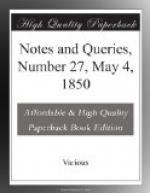And in a foot-note on Hamilton’s
bawn, in the original
edition, it is described as
“a large old house, two miles from
Sir Arthur Acheson’s
seat.”]
Versicle and Response.—What is the meaning of the following versicle and its response, which occur in both Morning and Evening Prayer?
“Give peace in our time, O Lord,
Because there is none other that fighteth
for us
but only thou, O God!”
Surely the “because” &c. is a non sequitur!
ALFRED GATTY.
April 6. 1850.
[In Palmer’s Origines Liturgice, vol. i. p. 241. (2d edit.), we find the following note on the response, “Quia non est alius,” &c.:—“Brev. Eboracens. fol. 264.; Brev. Sarisb. fol. 85.” Bishop Lloyd remarks on this verse and response as follows:—“I do not know what Burnet means by stating that this response was made in the year 1549, on the occasion of political occurrences, for this answer is found in all the foreign breviaries, in the Salisbury primer, and in the primer of Hen. VIII. See Burnet’s Hist. Ref. p. ii. b. 1. anno 1549.”]
Yeoman.—This word, the origin of which Dr. Johnson says is much doubted, in the general acceptation of it meaning signifies a small farmer; though several authorities quoted by Johnson tend to show it also signifies a certain description of servants, and that it is applied also to soldiers, as Yeoman of the Guard. It is not, however, confined to soldiers, for we hear of Yeoman of the Chamber; Yeoman of the Robes; Yeoman of the Pantry; Yeoman Usher of the Black Rod.
I should be glad if any of your readers can give an explanation of the word as used in the latter instances.
P.R.A.
Pusan.—Iklynton Collar.—Among the royal orders issued on the occasion of the marriage of Henry VI., contained in the fifth volume of Rymer’s Faedera, p. 142., occurs the following:—
“We wol and charge you, that ye deliver unto oure trusty and well-beloved Squier, John Merston, keeper of our Jewell, a Pusan of golde, called Iklynton colar, garnished with iv Rubies, &c., &c.”
What is the meaning and derivation of this word Pusan, and why called Iklynton collar?
E.V.
Who was Lord Karinthon, murdered 1665?—Can any of your readers inform me who was the English lord, murdered in France by his Flemish valet, in March, 1665, as stated in the following passage of Gui Patin’s Letters, tom. iii. p. 519., ed. 1846:—
“Hier, ce 18 Mars, je vis sur le pont Notre Dame, mene a la Greve, un certain mechant malheureux coquin, natif de Flandre, qui avoit poignarde son maitre dans Pontoise; c’etoit un seigneur anglois, doint il vouloit avoir la bourse.... Ce seigneur anglois qui fut poignarde dans son lit avoit nom de Milord Karinthon.... Dans le testament de ce bon mais malheureux maitre il se trouve qui’il donnoit a ce pendard de valet 20,000 livres.”
C. {441}




